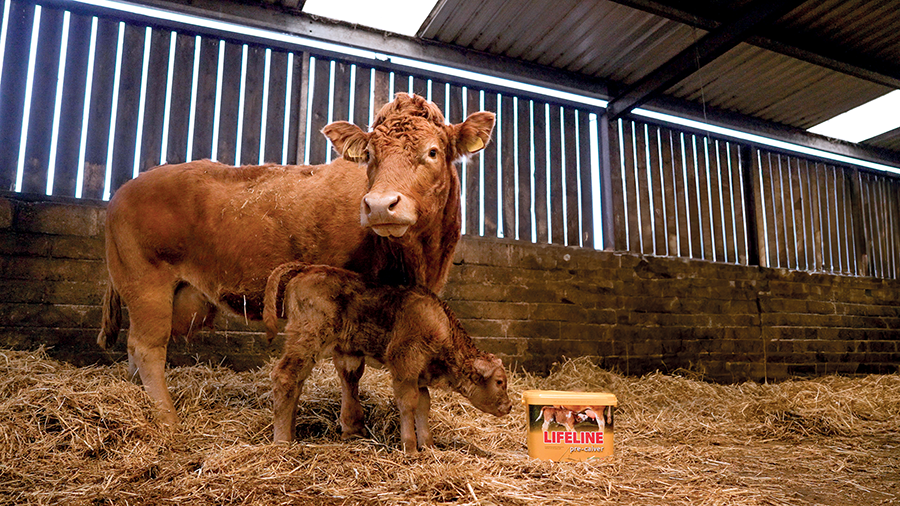Pre-calver bucket boosts colostrum quality by 20%
4th February 2024
A recent farm trial has found the Lifeline pre-calver bucket, a specialist pre-calving mineral supplement, increases colostrum IgG by 20% when offered for two months prior to calving.

The trial took place from January to mid-April 2023 on a UK suckler farm with a herd of 43 Simmental cross cows. In previous years the cows had received a bolus prior to calving to provide trace element and vitamin supplementation. The trial was designed to compare this approach to the use of Lifeline pre-calver.
Lifeline pre-calver is a unique mineral, vitamin and trace element bucket for in-calf cows and heifers to help optimise the calving process and immunity in the calf. Containing high levels of magnesium to help optimise calving contraction strength and minimise potential calving problems it also features a blend of nutritional boosters, including lactose, mannan-oligosacharides and beta-glucans to support the cow’s immune function and colostrum quality.
Bolus vs Lifeline
During the on-farm trial one group of cows remained on the farm’s bolus programme, receiving a full spectrum bolus with trace elements and vitamins two months prior to the average calving date. The other group received no bolus and instead received Lifeline pre-calver buckets free access for two months before calving, at a ratio of one 22.5kg bucket per 15 head of cattle.
Both groups were managed in the same way, housed on straw, and fed big bale silage and straw ad-lib until calving. Post-calving, all cows were offered ad-lib silage and straw plus 6kg of barley and 1kg of beans.
The trial finished on the 19th of April once all the cows had calved. Colostrum samples from cows in both groups were frozen at calving and sent to an independent laboratory for total IgG analysis. This showed that cows on Lifeline pre-calver had an average colostrum IgG of 188.2mg/ml compared with 156.5mg/ml in the bolused cows. This represents an increase of 20.3%.
Performance impacts
In the final six weeks of pregnancy, cow nutrient stores are under immense pressure to produce colostrum while the majority of foetal growth takes place. Availability of key trace elements, vitamins and minerals will have a direct impact on the short and long-term performance of livestock giving birth and their offspring.
These results show the benefit of supplementing with micronutrients and additional nutritional boosters to support total colostrum production and immunoglobulin concentration. Supplementation is essential in pre-calving herds – especially those on a primarily forage-based diet. Colostrum quality, calving ease, fertility in the subsequent service period, animal health and liveweight gain are just a few of the factors that will be impacted by micronutrient availability.
Silage quality impacted
Industry analysis has shown this year’s growing conditions have significantly impacted silage quality, making it even more important going into this pre-calving period for cows to be supplemented with essential trace elements, vitamins and minerals. Both Lifeline pre-calver and the bolus contained key micronutrients including cobalt, copper, iodine, manganese, selenium, zinc and vitamins A, E and D3. However, by offering Lifeline pre-calver cows were able to consume additional quantities of nutritional components not provided for by the bolus.
Lifeline pre-calver is fortified with essential minerals including magnesium, phosphorus and sodium. It also contains prebiotic carbohydrates that are derived from yeast cell walls, which may increase total colostrum production and immunoglobulin concentration through stimulation of the innate immune system.
This trial’s findings highlight the potential opportunities to stretch pre-calving supplementation further in order to support a positive effect on maternal colostrum. Feeding Lifeline pre-calver in the final six to eight weeks before calving will help to optimise your pre-calving supplementation programme, Rumenco explains, by delivering a full spectrum of micronutrients with unique nutritional boosters to support colostrum IgG production.
Read more livestock articles here
